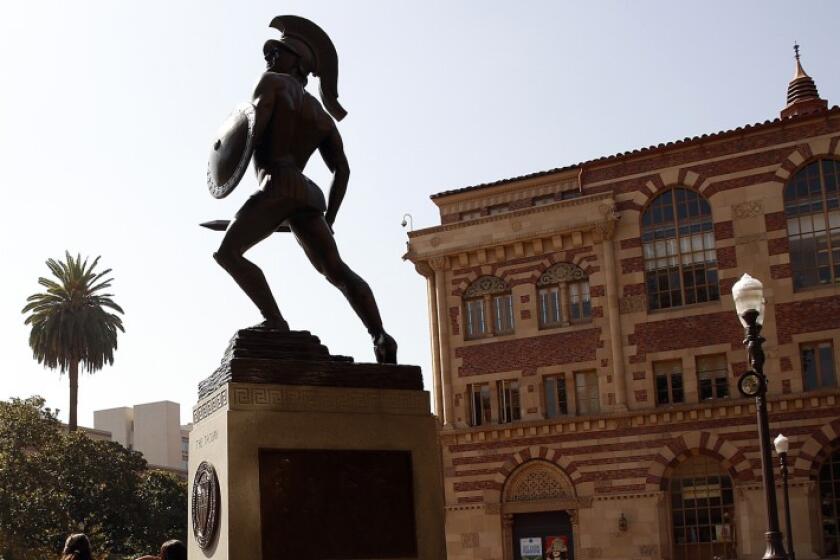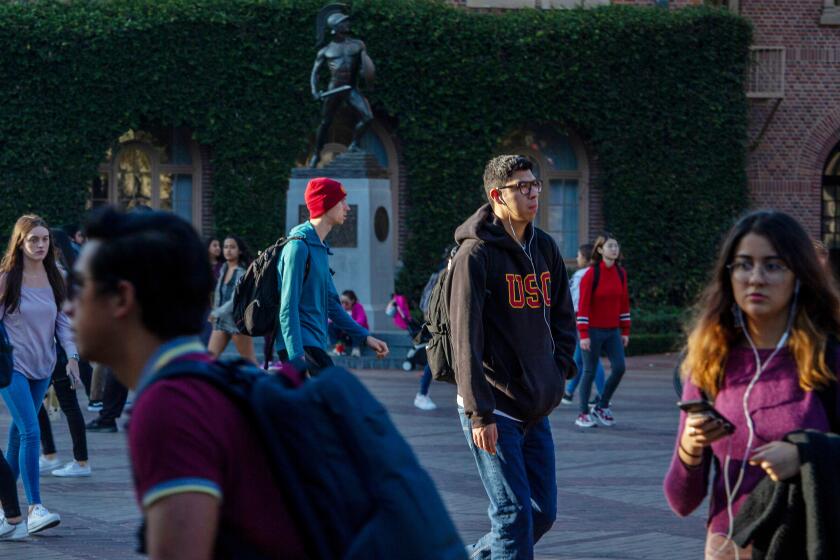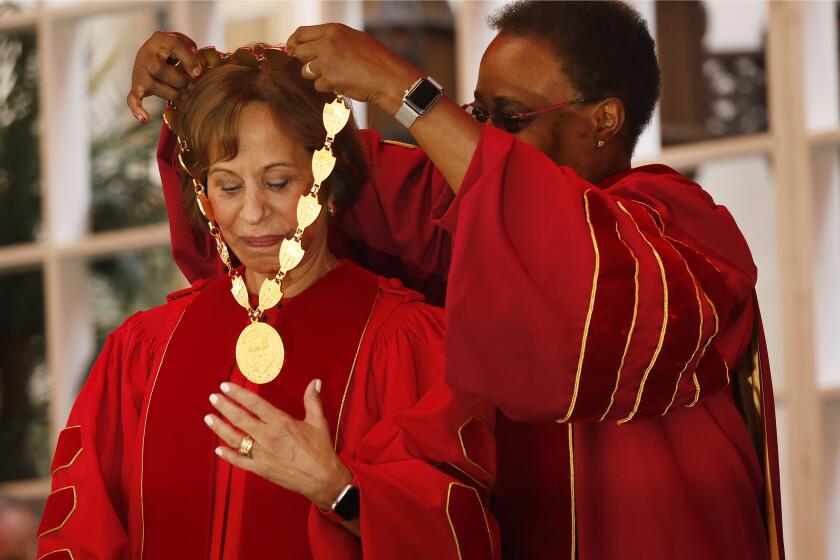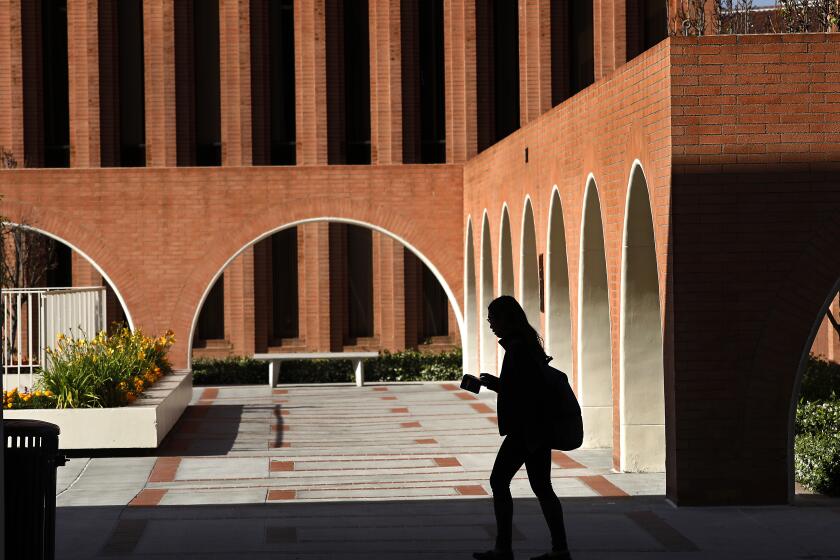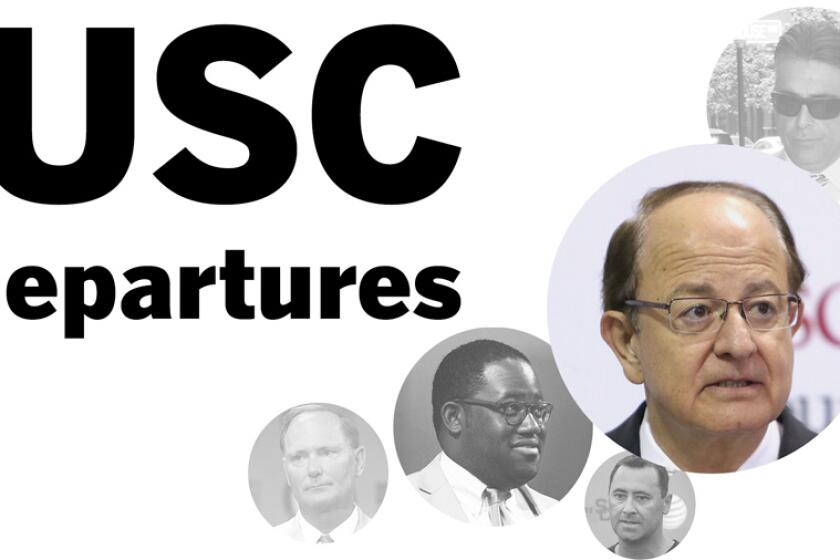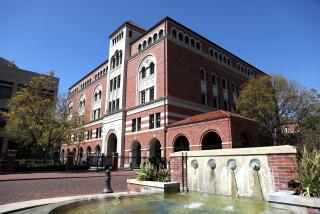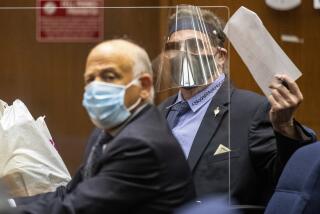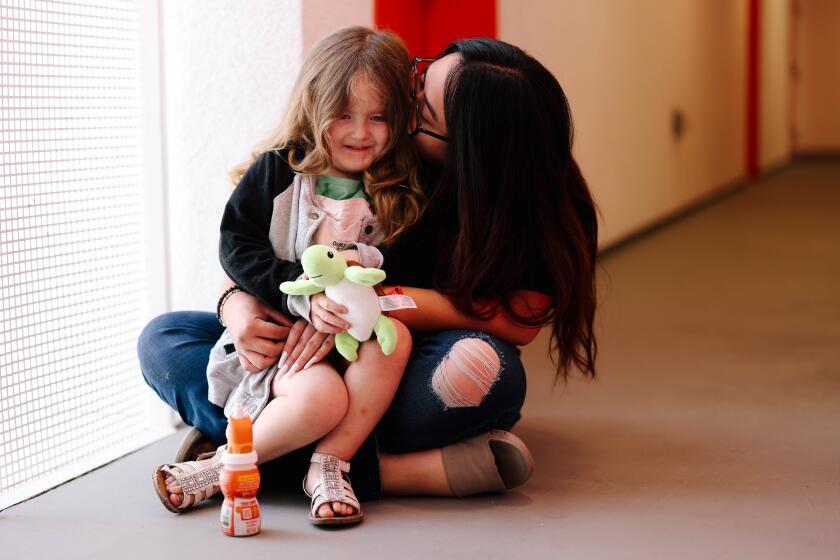9 student deaths at USC since August stun campus, spark alarm
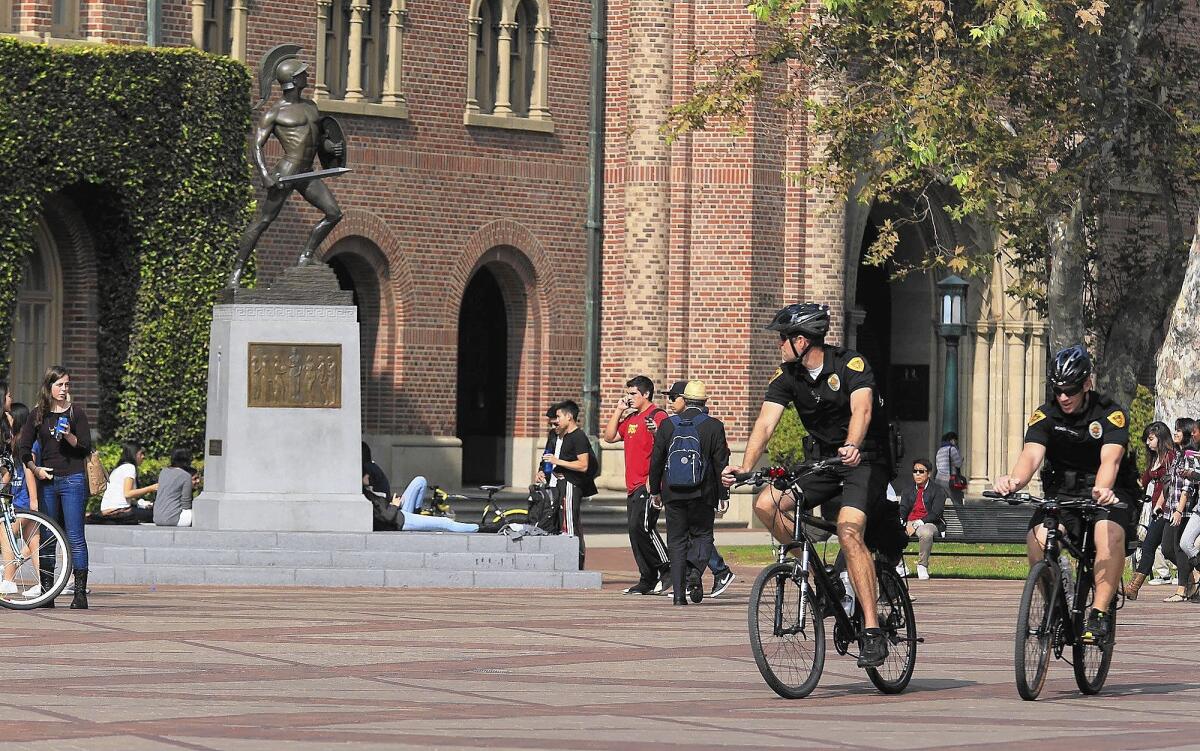
A series of student deaths at USC this semester has prompted concern and a demand for answers among the campus community.
The latest death occurred Monday afternoon, when a 27-year-old man was found dead in an apartment off campus. The cause of his death is under investigation. The man was a USC student, university officials said Tuesday.
The death comes days after top USC administrators sent letters to students and parents acknowledging the series of fatalities among the student body of roughly 47,500 undergraduates and graduates.
University officials confirmed this week that nine students died between late August and early November. Not all causes of death have been determined, but officials say three were suicides. In one note to the campus community, USC President Carol Folt and other administrators wrote that “the student losses are devastating and heartbreaking for all of us.”
“There is a great deal of speculation about the causes of these deaths and most are being attributed to suicide,” the letter says. “This is not correct.”
Winston Crisp, the university’s vice president for student affairs, said he and other administrators decided to move quickly with as much transparency as possible to quell rumors about the deaths, as well as to remind students that resources are available if anyone does need help.
In a letter sent to students just after 10 p.m. Tuesday, top USC officials warned against the dangers of opioid use.
School administrators have faced a balancing act, trying to share adequate information with students without overloading them with unnecessary details. Although not all the deaths have been attributed to suicide, the lack of information has prompted speculation among parents and students alike, increasing concerns.
The wide range of reactions in the USC community following the death notifications highlights the difficult and sensitive situation facing campus officials.
Crisp said that some students who had not known about the deaths said recent information and unknown details have been emotionally triggering. Some families have expressed gratitude after receiving the emails. Others have voiced dismay over a lack of information. And yet others think that the details so far provided have made matters worse.
“We know that our students are looking for answers,” said Sarah Van Orman, chief health officer for USC Student Health. “It’s important that if we hear misinformation, we share what we do know.”
The first death this semester was reported in late August, two days before classes began. Incoming freshman Matthew Olson, 18, was hit and killed on the 110 Freeway while walking between two FasTrak lanes.
The series of deaths has hit the campus community hard. In a typical school year, Van Orman said the university had experienced four to 15 student deaths. Last year, six were reported during the entire year.
After a spate of deaths at USC, officials are struggling with what information to release about the students who died.
Student Body President Trenton Stone, a junior originally from Salt Lake City, said all eight members of his executive board, including himself, knew at least one of the people who had died over the last three months.
“It’s definitely been a really tough semester for us,” Stone said. “There’s a lot going on, and everyone’s asking the same question: What can we be doing?”
Stone said the student government was planning a community event for people to come together to support one another, alongside health professionals. Stone has been on campus amid previous student deaths, but the number of recent deaths in a short span is especially jarring, he said.
Natalie Bettendorf, a junior and managing editor for the Daily Trojan, published an article Monday about the deaths and the university’s attempts to boost mental health resources. Bettendorf, who developed a wellness initiative in the newsroom to ensure staff members are getting support when covering difficult events, said the newspaper began discussions on how to cover student deaths last year.
“Students are pleading for answers from the university,” she said. “There’s a sense of desperation from within the student body. There have been too many deaths and not enough answers.”
Crisp and Van Orman said that the issue is evolving and that plans to appropriately address student concerns are being assessed in real time. At this point, administrators are continuing to point students to mental health services on campus, while considering whether to bring in more counselors.
An outsider who previously ran the University of North Carolina at Chapel Hill, Folt is the first woman to hold the post. She takes the helm as the private university is trying to recover from years of scandal.
“There is no standard for what universities do,” said Jonathan Singer, an associate professor at Loyola University Chicago and the president of the Washington, D.C.-based American Assn. of Suicidology.
Singer said universities have historically shared information conservatively, in part because of a fear of a contagion effect, with one death triggering another, Singer said. Youth in particular are susceptible to a contagion effect because they are more vulnerable to peer influence, he said.
A staff member at the university’s counseling and mental health center, who did not provide his name, said there are 45 counselors and four psychiatrists on staff. He said there’s been an increase in students seeking services since USC’s email addressing the recent deaths.
On Tuesday afternoon, 13 students were waiting to be seen. Approximately 30 counselors and two psychiatrists were on hand. The center works by appointment unless a student has an urgent need. Non-urgent appointments take place within 48 hours, the staff member said.
While the university continues to remind students of available resources, some say the school’s efforts are lacking. Morgan Spencer, a junior, said she has been constantly disappointed in how USC has addressed deaths on campus.
“Each time something happens, I get an email from the office of the president offering empty condolences,” she said. “I would like to see more response from the new president’s office, figuring out why there have been at least three student suicides.”
USC trustees approved far-reaching reforms aimed at correcting the insular leadership that failed to effectively handle several scandals over the past few years.
Friends who’ve sought counseling services have told her they’ve had to wait weeks for an appointment. She thinks the university should conduct a campus-wide mental health survey.
In a July op-ed published in The Times, dean of religious life at USC Varun Soni wrote about the “loneliness crisis” on college campuses.
“Every year, it seems, I encounter more stress, anxiety, and depression, and more students in crisis on campus.”
Dr. Paul Nestadt, a Johns Hopkins University psychiatry professor who studies suicide, said three suicides on campus in one semester is roughly in line with the annual national suicide rate for college-aged people: 14 out of 100,000. He pointed out that national suicide rates have increased 30% over the last two decades, with even bigger jumps among college-aged students.
USC officials are likely grappling with how much information to release about the deaths — and there is no research guiding universities in handling these sensitive issues, he said.
“They are in a bind for sure,” he said. “The whole nation is struggling with this. ... We’re having to learn more and more as these rates go up how to best deal with this.”
He said that dealing with these deaths will be a learning experience for USC — one that other universities may look to in the future.
Two students who died attended the School of Cinematic Arts. A faculty member said that on Monday evening the school’s faculty and staff met with counselors to talk about how they could help their students. She said that in the last year, the School of Cinematic Arts has been pushing to get more support for students who struggle with anxiety.
“It truly impacts everyone when something like this happens,” she said.
The past few days have been a struggle for Sunday Smith and her cohort at the film school. In the last two weeks, students have been notified by email of the deaths of two of their peers.
They have needed time to grieve, said the senior, adding that students have been having trouble sleeping and focusing.
“Things should be on pause and the school should let students take a breather, but everything is still in motion,” she said. “Obviously you can’t move on if you can’t take the time to grieve.”
It’s a post that will put Charles F. Zukoski directly over several ongoing quagmires, including the college admissions scandal, a fiscal crisis at the school of social work and turmoil following the ouster of the business school dean.
Last week, one of her teachers allowed students to take some time at the end of class to talk about how they were coping with the deaths. Smith said the conversation helped.
“There’s been a lot of death around me.”
If you or someone you know is having thoughts of suicide, you can call the National Suicide Prevention Lifeline at (800) 273-8255. A caller is connected to a certified crisis center near where the call is placed. The call is free and confidential.
More to Read
Start your day right
Sign up for Essential California for news, features and recommendations from the L.A. Times and beyond in your inbox six days a week.
You may occasionally receive promotional content from the Los Angeles Times.
